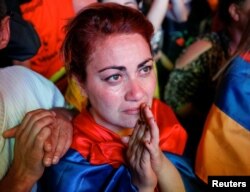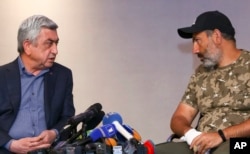Former government officials and citizens in Armenia expressed reservations about the ruling party's decision to block a bid by opposition leader Nikol Pashinyan to become prime minister, setting up a standoff between the elite, which has run the state for more than a decade, and thousands of Pashinyan's supporters camped on the streets.
Armenia's former defense minister, Seyran Ohanyan, told VOA's Armenian Service he expected to see Pashinyan elected prime minister, which in his opinion would have resolved the unfolding political crisis.
Armenia's parliament voted 45-to-55 against Pashinyan, leaving him eight votes short of the majority needed to capture the South Caucasian nation's most powerful office.
"Nikol Pashinyan, indeed, deserved to be the prime minister in this new situation and implement changes expected and demanded by people," Ohanyan said.
He also stressed that the ruling party's stated rationale for not appointing Pashinyan — that electing an opposition figure as prime minister would imperil national security — should be questioned.
"Otherwise, we will never have any political changes!" Ohanyan told VOA. "Just the opposite, political changes are the major pillar of the military strength of our country, which is linked to the economy. Whoever raises the economy, will also help the army."
While observers have expressed fear that any unexpected political turmoil resulting from Tuesday's parliamentary sessions could destabilize the Moscow-allied nation, which has been locked in a territorial dispute with Azerbaijan for decades, Pashinyan had met Sunday with Russian lawmakers, telling them his premiership would not threaten Yerevan's close ties with Moscow.
Stepan Demirchyan, Armenia's former opposition leader 2004 presidential candidate, said Pashinyan's "movement can't be stopped."
"This is a continuation of the previous struggle, and it should reach its logical goal," he told VOA. "I have no doubts Nikol Pashinyan will eventually become a prime minister. Yet, the major goal is to have snap and fair elections in our country."
Citizens react
Ambassador Richard Kauzlarich, the former top U.S. diplomat to Azerbaijan, told VOA he thinks the Armenian people should have the right to decide their own fate by themselves.
The more external powers involved, he said, the higher the level of uncertainty.
"The outside powers — in particular, Moscow and Washington — need to stand back from this process, and that will be easier to do for Washington than for Moscow," he said.
People on the streets of Yerevan, who did not want to share their names, seemed to echo these opinions.
"There is no alternative. Nikol should sit on the prime minister chair," said one pub patron as he watched the political coverage on television.
"The people's candidate should be the prime minister," said a woman sitting nearby.
Pashinyan, who addressed a rally of his supporters immediately after the vote, vowed to continue his movement.
On Monday, Pashinyan promised to stage nationwide strikes if the legislature failed to appoint him.
The 42-year-old opposition lawmaker, who had led 11 days of street demonstrations over an alleged power grab by former prime minister Serzh Sargsyan that threw the former Soviet republic into a political crisis, was widely expected to receive the 53 votes required to secure the post from the 105-member parliament.
Former president Sargsyan
As the only candidate officially nominated for prime minister, Pashinyan, a member of the Yelk or "Way Out''-led alliance, which holds 47 votes among its loosely allied opposition constituents, had secured assurances of further support from Sargsyan's ruling Republican Party.
Sargsyan, who was elected prime minister by parliament on April 17 — some eight days after his two-term presidency ended due to term limits — previously had said he would not seek to become prime minister after recently-implemented constitutional changes, which he championed during his presidency, made the office of prime minister more powerful than that of the presidency he was forced to vacate.
According to statistics by the United Nations, more than 11 percent of Armenians live below the poverty line, earning less than 1,530 Armenian drams ($3.20) per day, and as Bloomberg reports, emigre remittances from Armenia's 8-million-strong diaspora comprise 14 percent of national GDP.
Under Sargsyan, Armenia barely recovered from a GDP decline of 14 percent in 2009, only to witness a 7.5-percent surge of economic growth in 2017.
By the end of last year, however, the economy faced deflation and extremely weak domestic demand.
The government has grappled with constant budget deficits, and the unemployment rate remains above 16 percent.
This story originated in VOA's Armenian Service. VOA's Aram Avetisyan reported from Washington.







